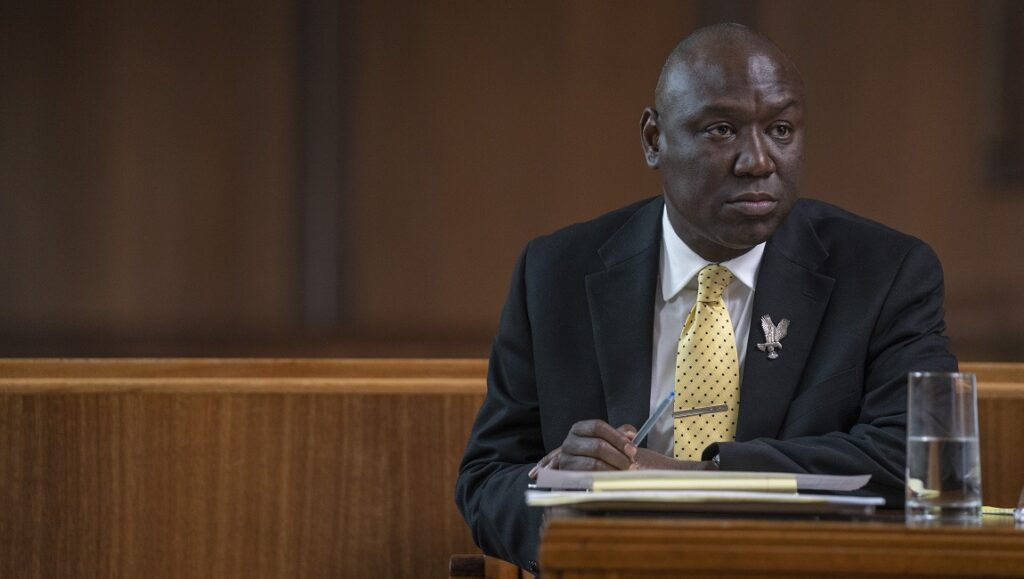CIVIL wades into necessary discourse, but stops short of probing any of the thornier facets of Crump or the culture that has led to his work.
There have been many things said about the nature of justice. Viewing Nadia Hallgren’s newest Netflix release evokes the idea English author Arnold Bennett once suggested, that “the price of justice is eternal publicity.” Few committed to the pursuit of true legal equality in America would know this better than civil rights attorney Ben Crump, the central fixture of the documentary feature CIVIL. Hallgren’s film details a single year of the ebulliently driven lawyer’s career — moving from case to case, balancing family life against the demands of his professional commitments, perpetually performing his roles as spokesman, advocate, and moral guardian with a target on his back under the hot glare of news cameras. The film’s first scenes establish Crump as a singular entity, silhouetted in a haunting bath of darkness as he counsels a relative of George Floyd mere hours after his murder. He is made to seem more myth than man, clearly weary yet still a supernatural force of optimism. That very tension runs through the heart of CIVIL, which strives to be a personal examination but falls short of striking bedrock. Yet Hallgren’s moving direction rousingly channels Crump’s ethos to uplifting and ultimately winning effect.
What we learn about the man we learn at a remove. We take stock of his unflagging compassion by observing assorted acts of kindness. Crump is seen consoling — caressing hands, patting shoulders, offering generous hugs — often his opening act in response to unspeakable tragedy. Even from the twitches and frowns animating his face, which Hallgren frequently frames close up as a compellingly emotive canvas, we infer that he empathizes deeply to the point of almost absorbing his clients’ pain. We flash through his earlier life in tightly edited sequences, their neatness as visually appealing as they are slickly distancing. One section where Crump reflects on his upbringing intersperses pictures of his home life, influential grandmother, and professional rise with fine art photography of Black people, transubstantiating his mortal life into an integral component of the long freedom struggle’s canon — no one would be faulted for coming away from CIVIL believing Crump is some kind of saint. The film conspicuously operates as a vehicle for a specific creed that Crump preaches, whether it be to grieving next of kin occupying a living room or a crowd of protesters gathering to condemn a Confederate monument — “Symbols matter. Images matter.” The characters on screen, the statues we erect, the stereotypes we utilize in unambitious humor or when we need to make a snap judgment, these representations of people matter more in the collective consciousness of others than people’s lived realities themselves. And for no racial group in the United States does this ring more true than Black Americans. In his wrongful death cases, Crump consistently posits that victory — in this case civil settlements with a monetary reward — hinges on a strategic presentation of personal evidence. In other words, how can we best arrange the facts of a life to produce an image of a person we want to root for, whose cause we want to believe in. This logic applies to George Floyd and Andre Hill and Sheira Brown and Tafara Williams and Crump himself. Intending to craft the best impression possible is antithetical to the goal of documentary, which is to reveal and investigate the truth of a subject in all its messy complexity. CIVIL makes clear, however, that Black people are forced to work with a different standard. It’s through this lens that we understand any artistic manipulation here not as sleight of hand, but as a means of self-preservation.
But CIVIL also has a frustrating habit of wading into interesting discourse without desiring to say much beyond a certain point. When we see Crump deflect, he’s rarely, if ever, pushed on the matter at hand. Seeing uprisings captured on news broadcasts fills this gentle giant with apprehension. He offers a message championing peace, patience, and prayer, a perspective that sounds genuine in its attempts to be both honest and anodyne. Crump receives suspicion from folks who believe he’s the civil rights equivalent of an ambulance chaser, profiting off of ever-present Black pain. He laughs off these claims, seemingly putting the issue to bed, though earlier in the film he alludes to gravitating to wrongful death in the first place because it was most likely to pay the rent. Some mildly nuanced commentary about the toxic expectation that a Black person ought to perform these labors free of charge to be “true to the cause” seems too much for CIVIL to handle. The hotel room Zoom chat between Crump and public policy consultant Tezlyn Figaro is one of the few scenes directly addressing the conversation around the efficacy of pursuing civil proceedings after a loss versus criminal proceedings — a conversation CIVIL would have dedicated more time to tackling if it was a stronger film. Instead, Crump is teed up to run through his talking points, his practiced mannerisms carrying over from the media appearances depicted in the preceding scenes. CIVIL is a monument to a man’s great deeds, superficially kaleidoscopic but essentially one-note, a tour through Crump’s busy docket. We’re inspired by his positivity, loyalty, and passion as much as we’re let down by how little beyond those core characteristics we actually get to see. Not long before the end credits, he explicitly muses over the central question of the film: Why these civil cases? Why this approach? Viewers are left grasping for a comprehensive answer. It could be for reasons as simple as what he observed at the film’s start. These tragedies never stop, so someone has to step up and do the work.
You can currently stream Nadia Hallgren’s CIVIL on Netflix.


Comments are closed.